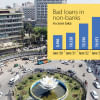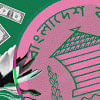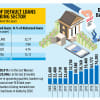State banks' default loan surges

Default loans in the banking sector shot to a historic high at the end of June this year owing to rising non-performing loans (NPLs) at state-owned commercial banks, said Bangladesh Bank (BB) yesterday.
The amount of NPLs at the state banks stood at Tk 74,450 crore, up 28.45 percent from that three months ago, said the central bank in its quarterly report.
With the spike, the ratio of their gross classified loans surged to 25.01 percent of their total outstanding loans.
Private banks and foreign banks also registered an increase in the volume of NPLs during the period.
Default loans at private banks rose 11.76 percent while foreign banks saw a 5.26 percent increase, taking the total default loans to Tk 156,040 crore at the end of the fiscal year (FY) 2022-23.
The amount was 10.1 percent of the total outstanding loans, the highest since September 2022, rising from 8.8 percent in March.
The ratio of non-performing loans to total loans in the banking sector experienced an upswing at the end of the fourth quarter, mostly driven by withdrawal of relaxed loan repayment policies and weaker business activities, said the BB in its quarterly.
The BB released the default loan figures a day after the World Bank said Bangladesh's financial sector vulnerabilities may worsen due to an increase in bad loans and create further pressure in terms of liquidity in the banking system.
The central bank said the NPLs remained a concern, necessitating closer monitoring of the defaulted loans.
"In this regard, BB has strengthened its policies to deal with the problem banks by signing memorandum of understanding and intensifying internal inspection to mitigate the NPLs," said the BB.
The central bank is also in the process of issuing guidelines on prompt corrective actions, which will empower the BB to intervene early and to take corrective actions for weak banks, it added.
The BB said the ratio of net NPLs to total loans recorded a significant rise from 0.30 percent at the end of March 2023 to 1.58 percent at the end of the fourth quarter of the fiscal year 2022-23.
This "reflects a considerable shortfall in provisions maintained during this quarter compared to the previous quarter", said the BB.
As per the central bank data, state banks suffered from the highest provision shortfall against classified loans followed by private banks.
The four state banks fell short of the required Tk 10,690 crore provision against the NPLs while private banks by Tk 11,270 crore.
However, specialised banks and foreign banks operating in Dhaka had excess provision against requirement, according to the central bank report, which also highlights the challenges the Bangladesh economy was facing.
The BB said the Bangladesh economy demonstrated its resilience by achieving a growth rate of 6.03 percent in FY23, maintaining a consistent growth trajectory in the post-Covid era.
"Notably, this growth was propelled by the manufacturing sector, spanning firms of all sizes, and a robust service sector. While the agriculture sector faced crop losses due to natural disasters, it still achieved commendable growth," it said.
For fiscal year 2023-24, the Bangladesh economy faces challenges of high inflation and external sector vulnerabilities, it said.
"Collaborative efforts between the government and Bangladesh Bank will be instrumental in addressing these challenges effectively," it added.

 For all latest news, follow The Daily Star's Google News channel.
For all latest news, follow The Daily Star's Google News channel. 








Comments